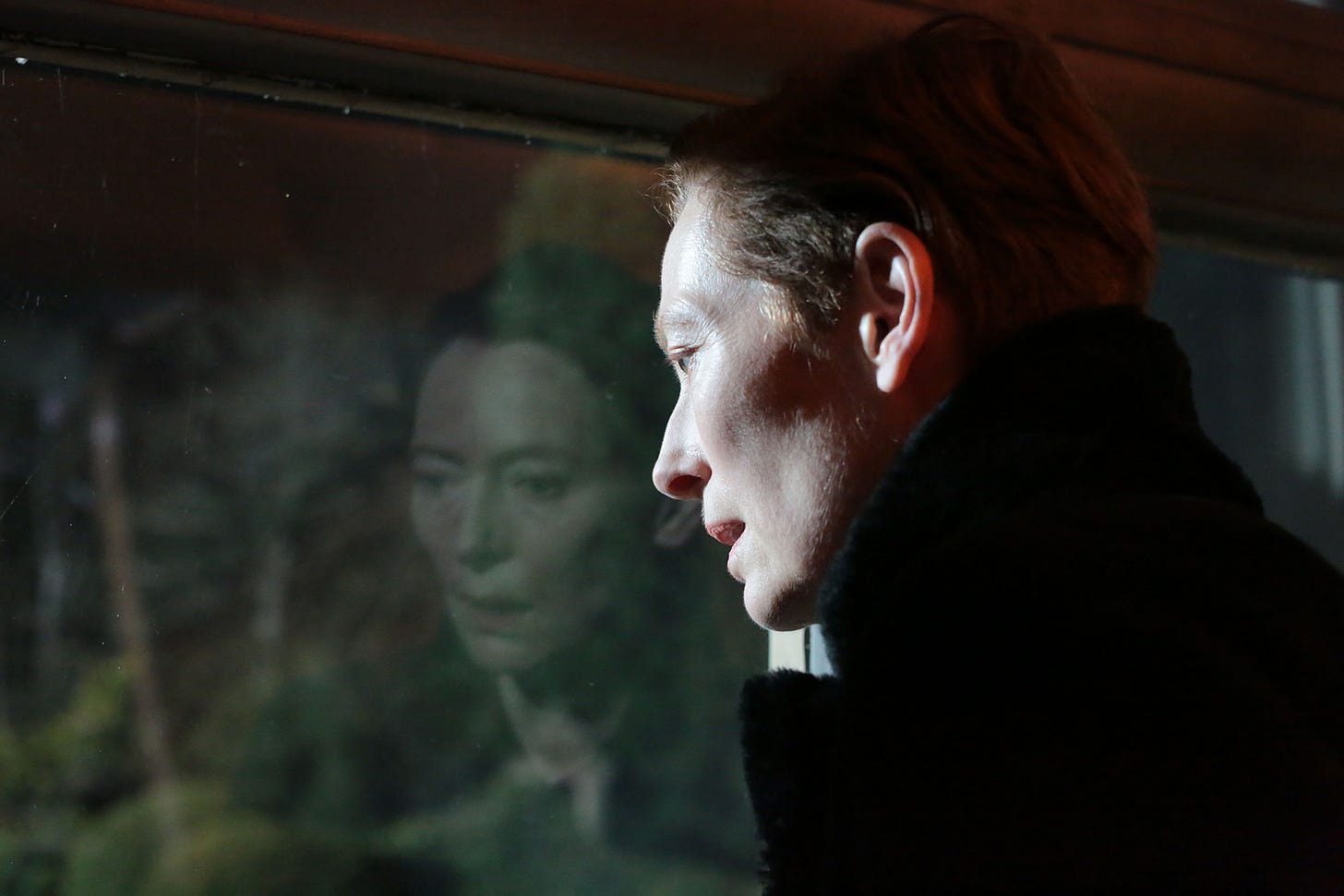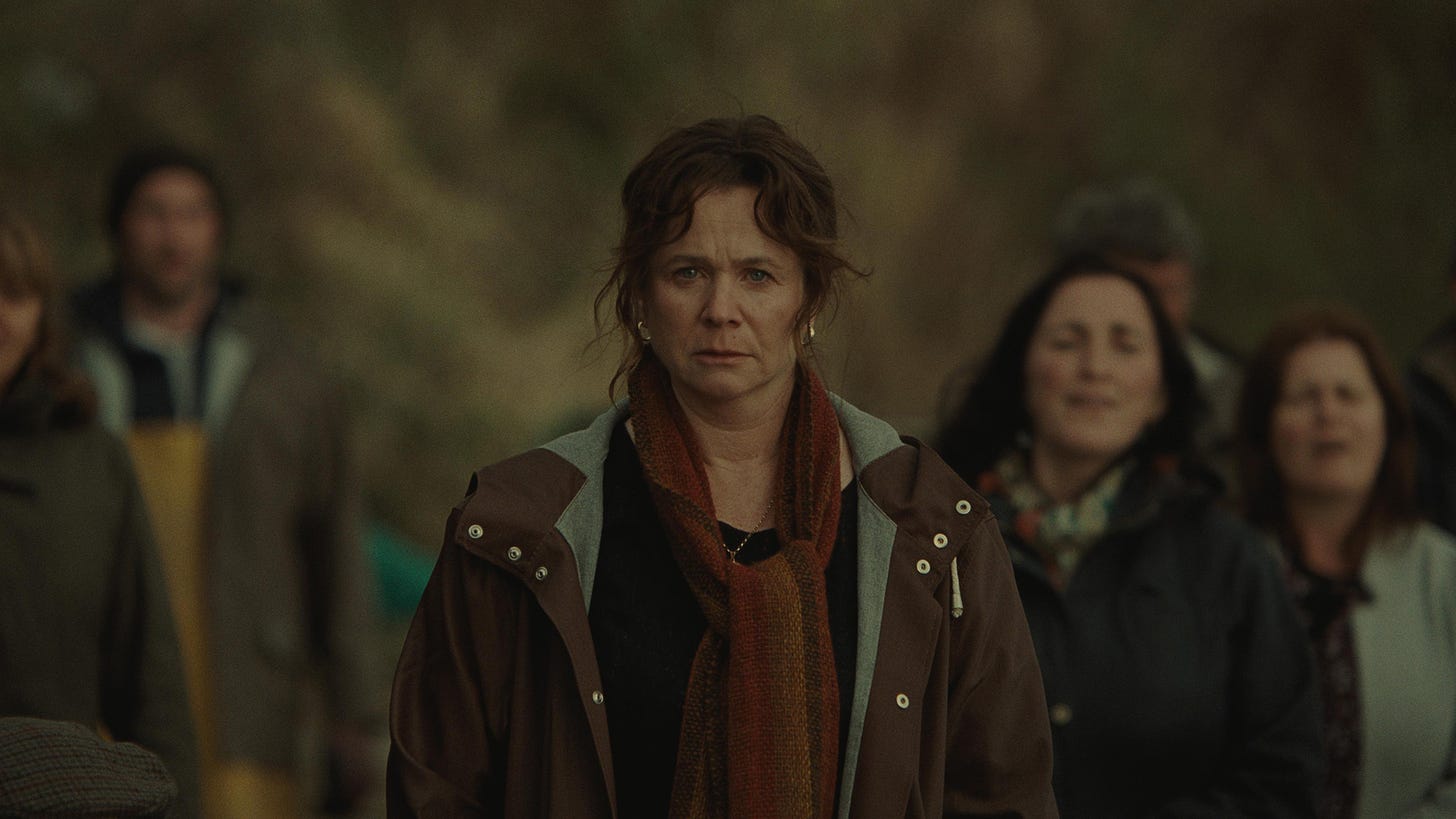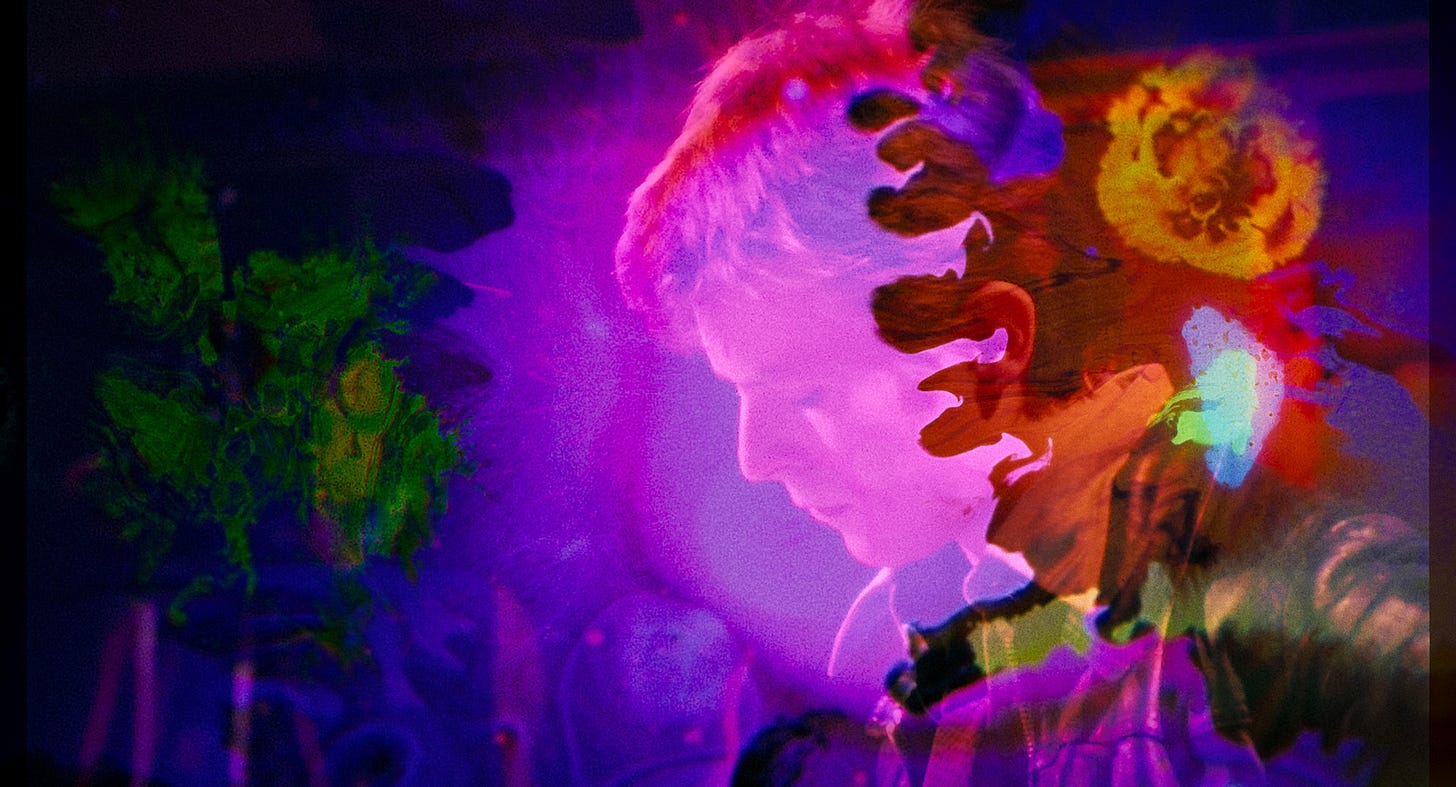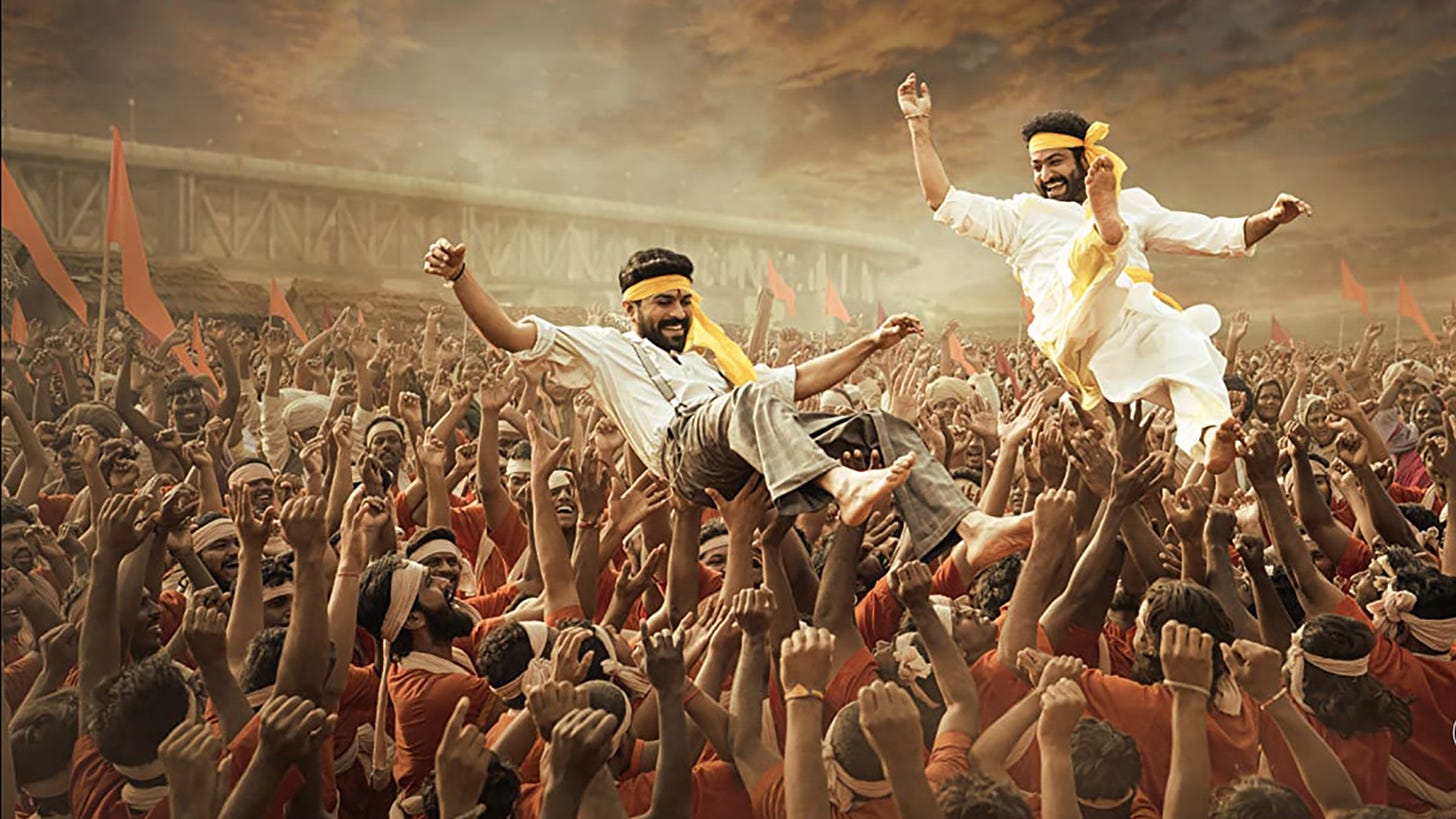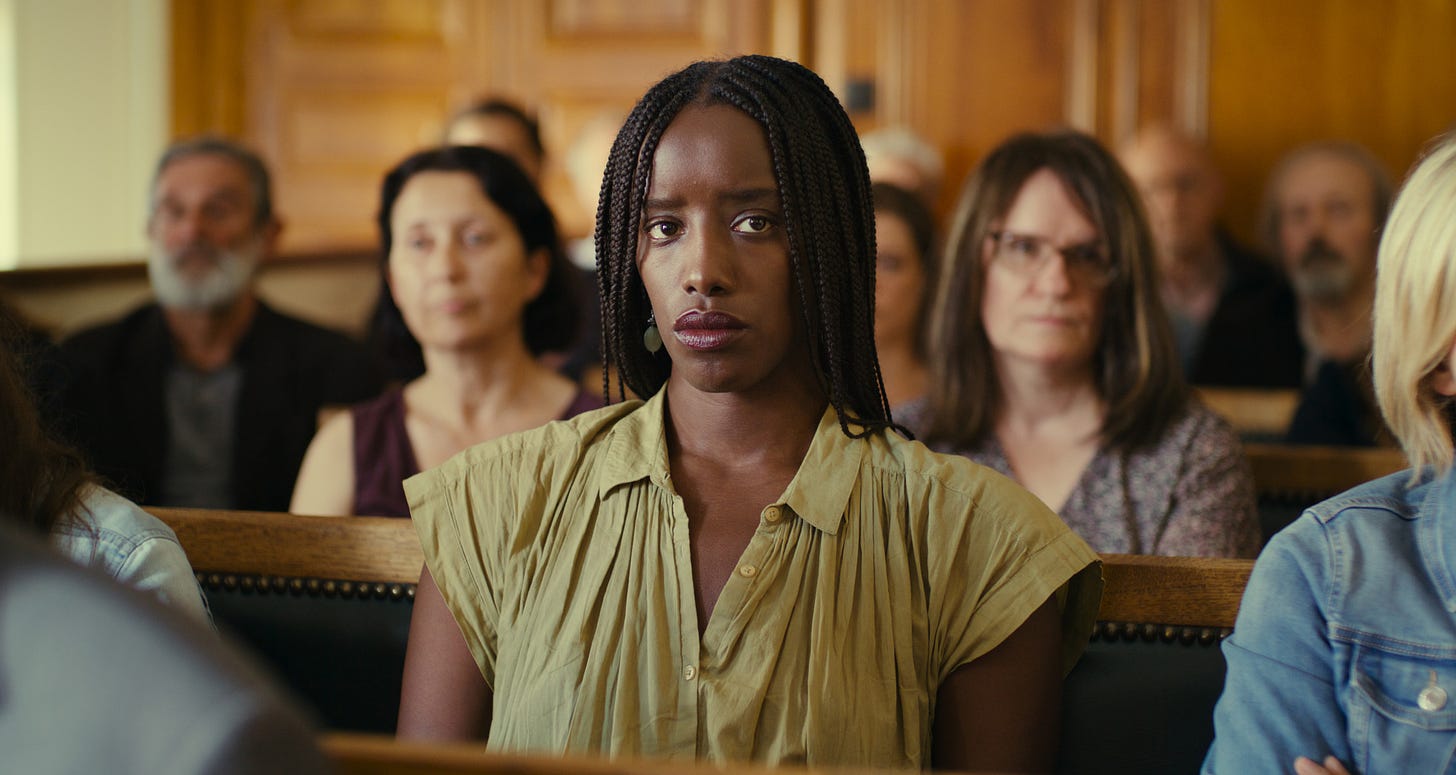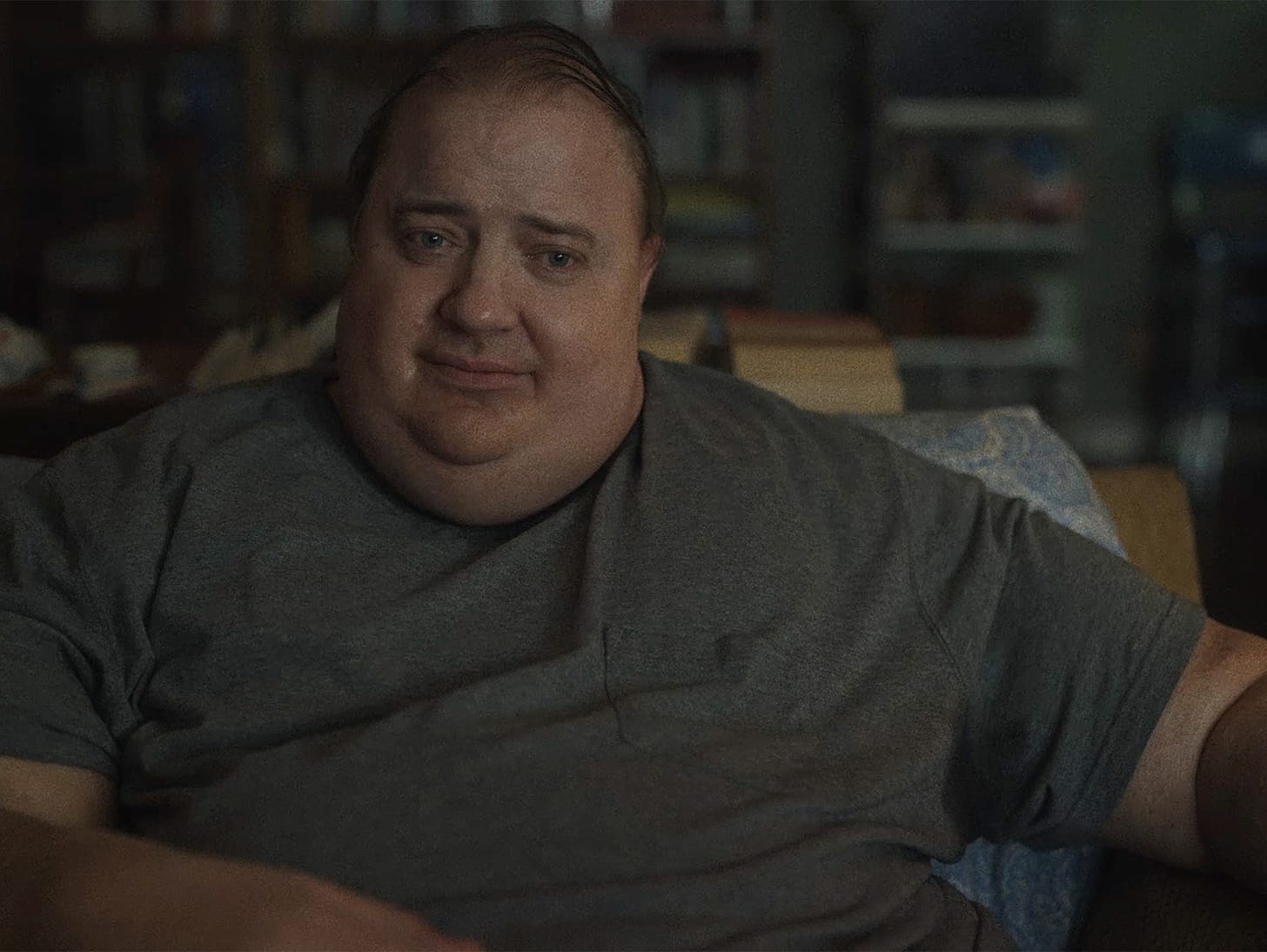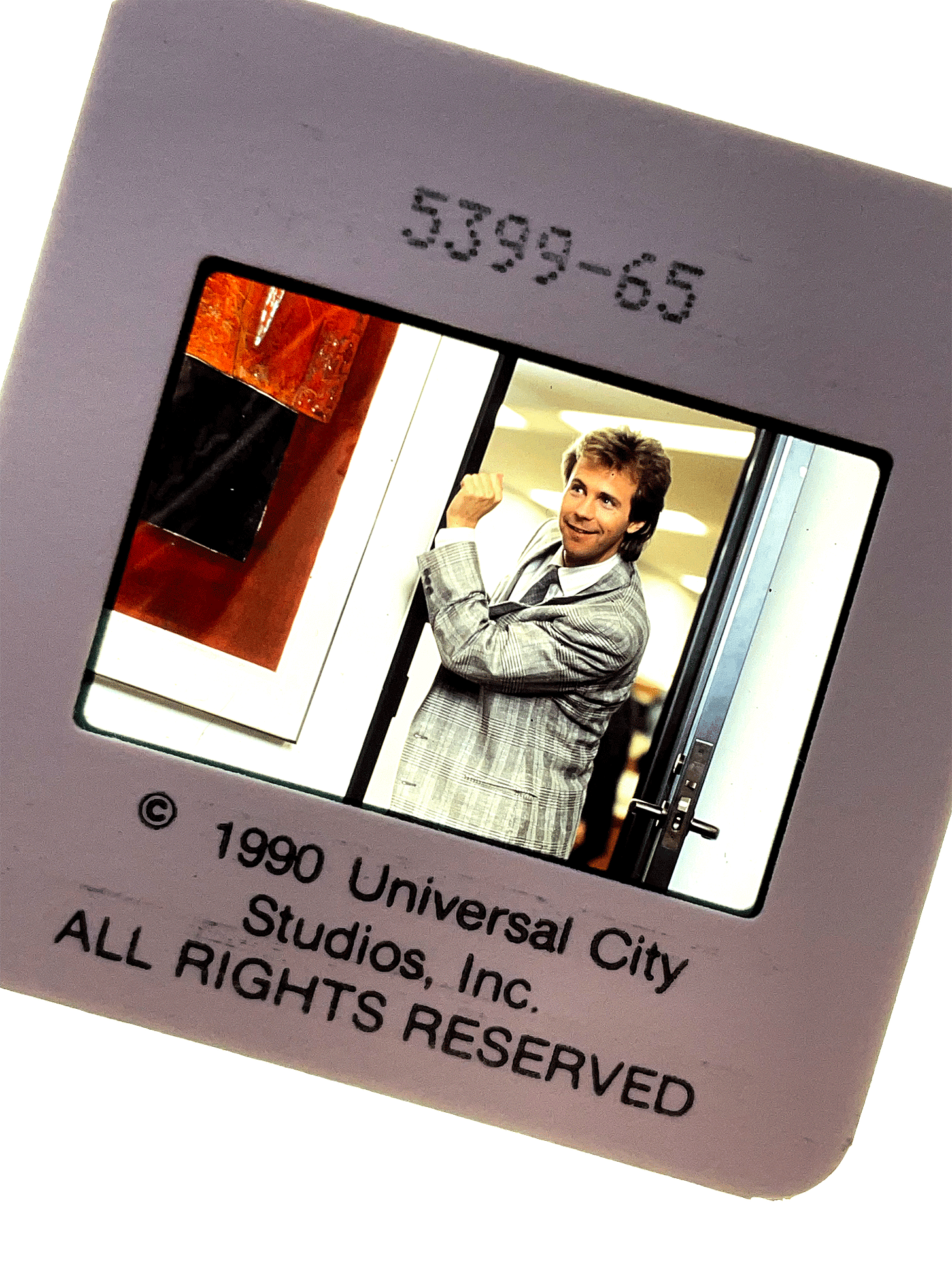Burned through a bunch more FYC screeners this week with still more to go. My GWNYFCA picks are in with the complete list of nominations being announced later today (12/23). And since my OFCS ballot isn’t due until 1/15, next week will consist of catching all the GWNYFCA nominees I haven’t yet seen to try and make my final vote as close to 100% as possible (although I might have to try and sneak out to AVATAR in theaters in order to do so depending on how the ballot shakes out).
I’ll hopefully fit in a few Christmas films too since it’s the season for Muppets and Michael Caine. But for those uninterested in yuletide favorites, it’s also the season for awards contenders finally being made available to the masses thanks to Santa’s annual gift of a staggered Wednesday/Friday release schedule.
What I Watched:
THE ETERNAL DAUGHTER
(now on VOD/Digital HD)
I’m a big fan of Joanna Hogg’s films, so I was really looking forward to THE ETERNAL DAUGHTER both because of its connections to her previous two films (THE SOUVENIR and THE SOUVENIR: PART II) by way of its characters and its foray into the supernatural (of sorts). She’s created a haunted house thriller wherein the ghosts arrive within the baggage of the visitors rather than the old mansion-turned-hotel itself. Julie Hart’s (Tilda Swinton) mother Rosalind (also Swinton) used to stay there often as a child when it was owned by her aunt, so the former thinks it a nice birthday destination for the latter to let those joyous days flood back.
With them, however, are also bad days. This place held both the playful fun of adolescent adventures and the horrors of trauma. Julie didn’t plan on that darkness. She only wanted to give her mother a glimpse into happier times and perhaps use the stories sparked by the memory in a new film she’s writing (Hogg simultaneously delivering its creation and result in a meta play on time). Finding that despair leaves a mark by ensuring Julie retain her own anguish of discovering those truths and the images of what Rosalind looked like when relating them. It casts a pallor on the entire proceedings wherein Julie cannot sleep or work. The wind, fog, and sounds of “ghosts” keep her trapped in a loop of her own making.
The film looks great and Swinton is great as the doting daughter and increasingly troubled mother whose spiraling demeanor brings with it a reveal that’s less surprising than it is welcome (Hogg casts one actor in two parts to render her compositions as the solution to a technical problem while also solving a narrative one). Does its discovery warrant ninety-plus minutes of what often feel like repetitive motions confirming what we already know? I sadly lean towards “No.” That’s not to say the messaging and metaphor don’t resonate, though. I simply posit that they still would if pared down to a thirty-minute short since I couldn’t stop checking my watch.
- 6/10
GOD’S CREATURES
(now on VOD/Digital HD)
As one son tragically dies in the water every superstitious fisherman on this remote Irish island refuses to learn to swim, another returns. Brian (Paul Mescal) has been gone for years, telling everyone he’d moved to Australia despite never sending an address. It’s thus a dream come true for his mother Aileen (Emily Watson). Children who leave rarely come back and those who stay often find themselves drowning like Brian’s old friend Mark or languishing in what becomes a prison of the soul. So, she lets him pick up where he left off working her father-in-law’s oyster farm now that he’s unable and her husband, Declan Conlon’s Con, couldn’t maintain it alone. It’s not what Brian ever wanted, but Aileen’s never been happier.
That high doesn’t last long, however. This perfect façade Aileen hopes might come to fruition starts stalling when father and son argue about the latter risking his life by working the farm at high tide and threatens to deteriorate once and for all when she’s called to the police station to answer a question: Was Brian with her the night of an attack? We know what she does, namely that she left him at the bar with his old high school flame Sarah (Aisling Franciosi). And considering the events that transpire the next morning, Aileen has to know something isn’t quite right. But can she throw this dream away so soon? Her instinct is to lie. To protect her perfect son at the cost of everything.
GOD’S CREATURES is co-directed by Saela Davis and Anna Rose Holmer (writer and director of THE FITS, respectively) with a similar sense of tension. Written by Shane Crowley (from a story by Fodhla Cronin O’Reilly and himself), the plot unfolds with a quiet yet hopeful intensity as we meet the players in this close-knit community that’s as quick to mourn a loss as throw the living under the bus to maintain the status quo. We can feel a reckoning approaching once the honeymoon of this prodigal son’s return starts wearing off, but we also want to believe Aileen’s image of her son is pure. By defending him without even talking to Sarah, however, she can’t help but let reality finally come into focus.
It’s a fantastic piece of storytelling with an authentic air of emotion that never feels unearned or embellished. This is a “boy’s club” world wherein abuse has always been ignored or accepted due to generations of embedded misogyny. And while it’s one thing to look the other way or let it happen to you, conscious complicity in someone else’s abuse is different. What does this choice do to how Aileen looks at her son? At herself? To lie is to let the entire town turn Sarah into a pariah. And for what? More toxic male rage to come? More silence for women like her own daughter Erin (Toni O’Rourke) to endure their pain alone?
The film’s second half (the lie occurs exactly at the midpoint) is tightly wound to ensure we cannot look away no matter how certain we are something even worse is on the horizon. Watson and Franciosi are amazing, their early friendship contrasted by their wordless glaring as though embroiled in a game of chicken that always finds the former’s Aileen turning in shame first. But what I loved the most is how the filmmakers never pretend this culture isn’t an intrinsic feature of the landscape—that the way forward won’t also be driven by dark secrets. It’s a somber, heart-crushing affair where dreams must forever remain unfulfilled fantasy.
- 8/10
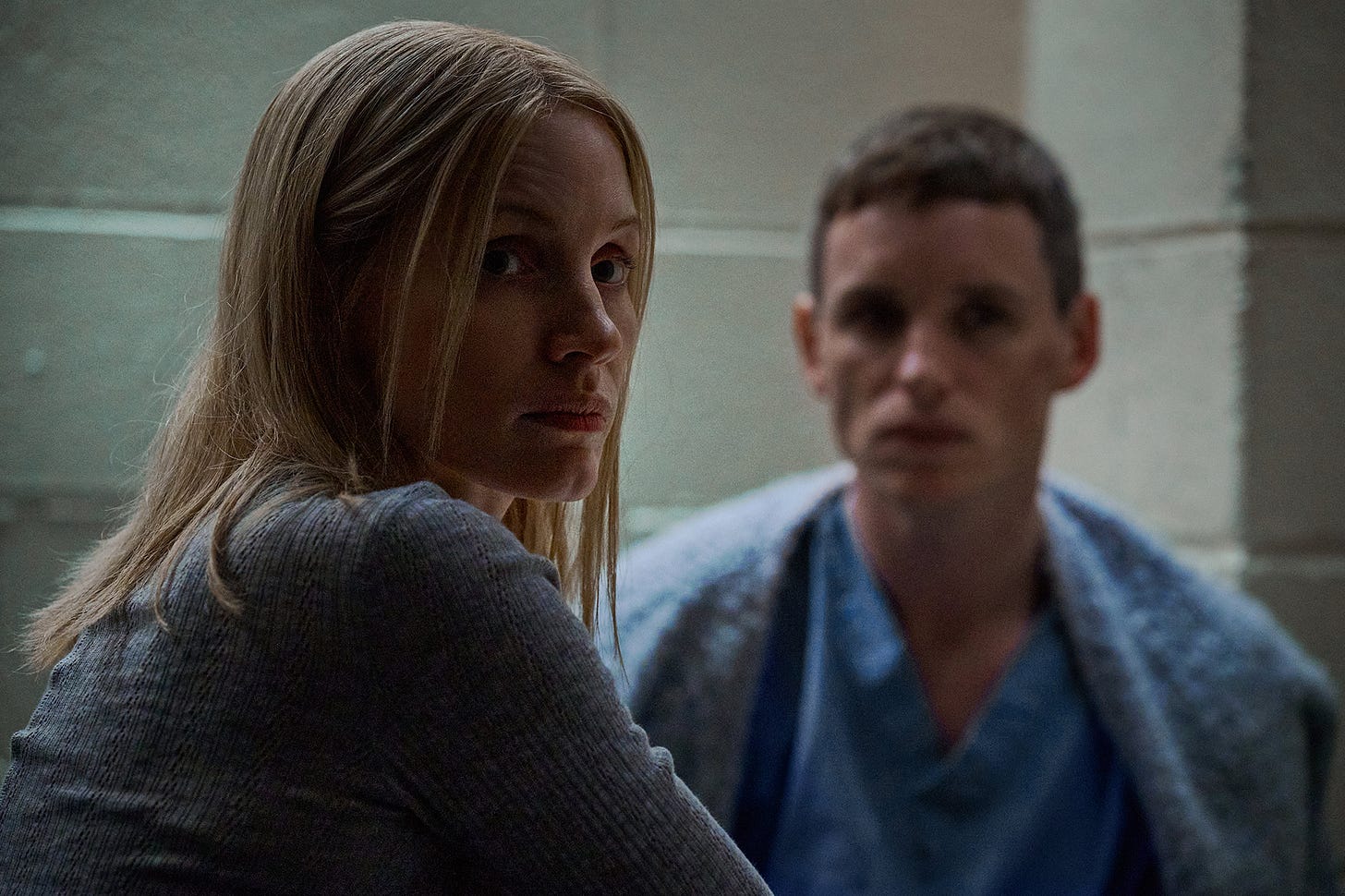
THE GOOD NURSE
(now streaming on Netflix)
Tobias Lindholm’s THE GOOD NURSE is a pretty solid true life drama that I believe works as well as it does because he and screenwriter Krysty Wilson-Cairns didn’t try and turn Charles Graeber’s non-fiction novel into a thriller. We know Charlie Cullen (Eddie Redmayne) is killing these people. That’s not up for debate. And humanizing him through his genuine friendship with Amy Loughren (Jessica Chastain) doesn’t negate that fact. I’d argue he becomes scarier as a result because it proves he is good at his job. He has the capacity to save lives. You could almost read his story in a way that makes him a warped activist trying to expose the hospital system’s penchant for caring more about their financial liability than human lives. Maybe that’s why he’s never admitted “why.”
That aspect is admittedly the most interesting. All the stuff between Charlie and Amy is familiar territory as far as “he was such a nice guy” hindsight is concerned. Where the filmmakers really hit their stride is the investigation headed by Noah Emmerich and Nnamdi Asomugha’s detectives and how their every move is obstructed by the hospital’s risk manager played by Kim Dickens. She’s impeding their progress because she needs time to get Charlie off her payroll before they can charge him with a crime. Talk about evil. And you can’t even put all the blame squarely upon her shoulders since she represents the ninth hospital to do so.
Redmayne is great in the role (the only reason I watched was because he keeps being mentioned as a potential Oscar nominee). Until a few instances later on when things begin to finally unravel for him, he’s a walking exemplar of empathy—so much so that we never fear for Amy or her daughters’ well-being, even when Lindholm tries to pretend we should. As such, I’d argue that it’s Chastain who leaves an even bigger mark. Between her heart disease, the pressures of being a single mother, her job responsibilities, and navigating the realization that her best friend is a murderer, her character is put through the ringer and more. She’s the “good nurse,” after all. The only one who finally did something.
- 7/10

THE MENU
(now in theaters)
Every time Chef Slowik (Ralph Fiennes) claps his hands to mark a new course, the entire dining room jumps in fright. And that’s before they discover they should be afraid. Because this exorbitantly-priced, exclusive seat at Hawthorne comes with a twist … but I’ll leave that to director Mark Mylod and screenwriters Seth Reiss and Will Tracy since the reveal proves an unforgettable moment of confusion insofar as believing whether what we’ve seen is real or part of the show. We want to assume the latter due to the theatricality and surreal absurdity of it all. Yet the longer we stay with these characters (guests and chefs alike), the more we understand that intent is everything.
THE MENU delivers a brilliant tonal mix of suspense thrills and humor considering how meticulously matter-of-fact the inevitable horrors and woefully up-their-own-asses the clientele prove. Between the table of “bros” (Arturo Castro, Rob Yang, and Mark St. Cyr), the washed up actor (John Leguizamo) name-dropping the chef as a personal friend, the elitist critic (Janet McTeer) and her editor (Paul Adelstein), and the aging couple (Reed Birney and Judith Light) treating this apparently magical (and bank-busting) event like just another Tuesday, there’s plenty of fodder for kitchen vs. customer antics. Restaurant host Elsa (Hong Chau) is only happy to comply.
But there’s also the pathologically oblivious Tyler (Nicholas Hoult) and his date Margot (Anya Taylor-Joy). He’s practically orgasmic the minute they land on the private island knowing his palette will shortly be tasting the world’s greatest food. She couldn’t care less because she was a last-minute addition—one that has thrown Slowik and his staff for a loop. The reason is crucial to the insanity to come and her background methodically constructed to allow the expository themes of service industry rage to grab a foothold for their explanation rather than merely screaming it into a void populated by those immune to its point.
Is the whole a bit too perfect in its plotting as a result? Perhaps. That precision is actually one of the best parts of the first hour considering how much comedy is born from it. Fiennes, Chau, and the restaurant staff are impeccable in their deadpan deliveries to offset the mounting frustration and shock their actions provoke from the “eaters.” This juxtaposition is so good that the whole suffers a bit when the truth of what’s happening and Margot’s presence are finally reconciled. The third act proves somewhat rushed and messy, the joke finding its limits with apparently nowhere to go. Thankfully, however, Mylod and company do stick the landing, pivoting back to cold, calculating finality with just a hint of earned (albeit conveniently) compassion.
- 7/10
MOONAGE DAYDREAM
(now on VOD/Digital HD)
Brett Morgen’s MOONAGE DAYDREAM is by all accounts a sensory experience rather than your usual idea of a documentary—rock, biographical, or otherwise. Sanctioned by the late David Bowie’s estate, Morgen comes in and hyper-kinetically edits together a two-plus hour epic of archival footage and interviews to juxtapose our assumptions with his public image and artistic prowess via an overarching representation of the icon’s “essence.” It’s not going to be for everyone due to its nonlinear linearity, expressionistic aesthetic, and over-long runtime, but even its detractors must admit the audacity of the enterprise is worth a look.
I enjoyed it. I didn’t love it. Would that opinion have changed had I seen it during its IMAX run? Maybe. It’s definitely built for a large screen and deafening surround-sound, so those attributes are perhaps a requisite for the so-called “transcendence” that many are quick to describe. That’s not to say it isn’t effective on a 50-inch television with a soundbar too. As a fan of the artist and the music, it was a treat to see and hear what Morgen did in the edit bay (although the repetitive footage was a distraction) to breathe new life into the artifacts.
Would I prefer a more straightforward biography? Yes. These things can often trend towards the realization that we let celebrities/artists talk too much rather than simply letting the work speak for itself. Because rather than clamor to watch this specific interpretation again (in many ways it says more about Morgen’s relationship with an enigma than Bowie himself), my first thought upon its completion was to fire up a couple albums and YouTube a few music videos—those that were included and, especially, those that weren’t.
- 7/10
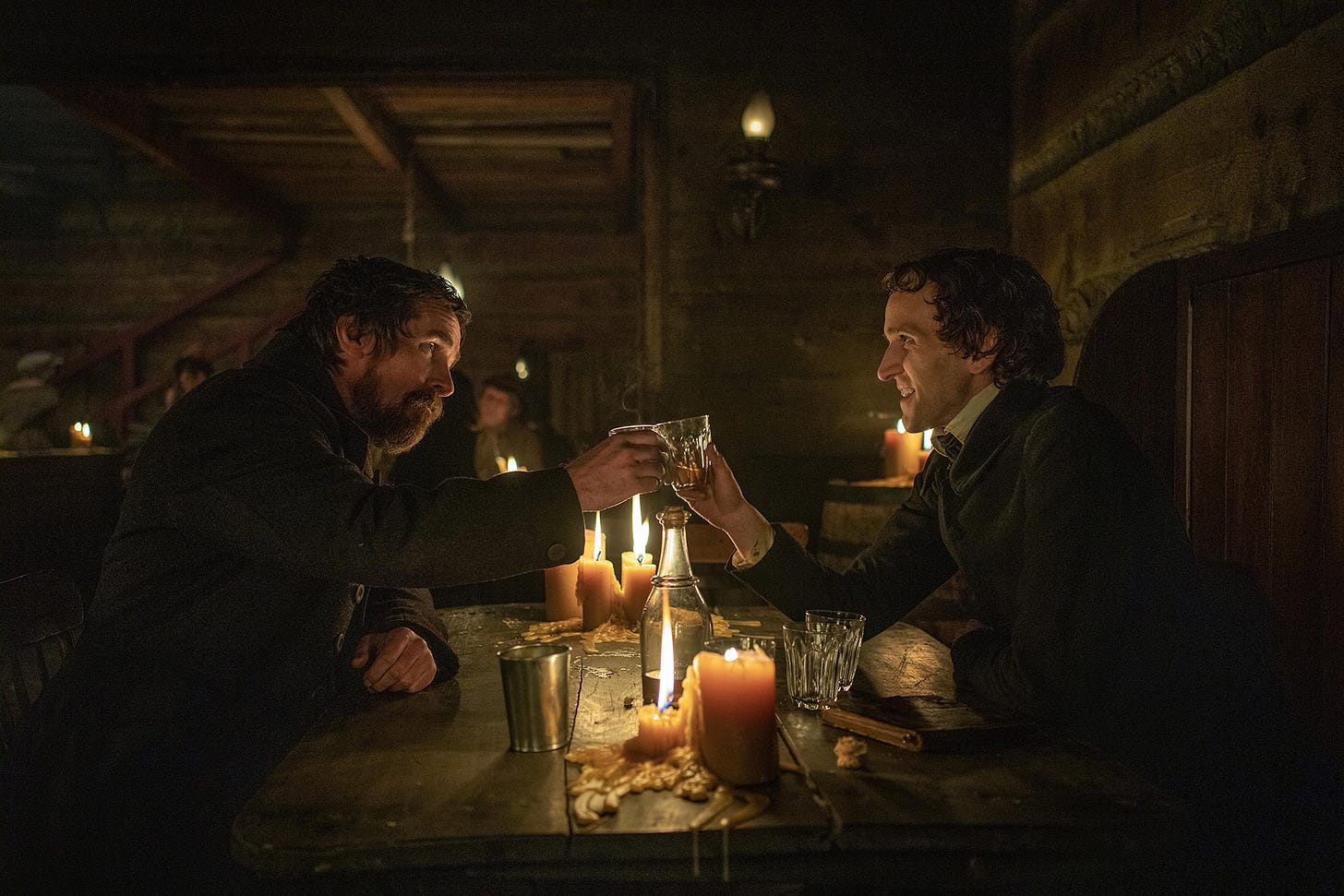
THE PALE BLUE EYE
(now in limited release; streams on Netflix starting 1/6)
What if, before intentionally earning a court martial at West Point, Edgar Allan Poe helped solve a murder that ultimately drew thematic parallels to his later work with the assistance of prophetic poems told to him in dream by his dead mother? Well, Louis Bayard sought to answer that question with his novel THE PALE BLUE EYE, presently adapted by writer/director Scott Cooper for the big screen. Poe (Harry Melling) is but a cadet who fancies himself a poet—a bystander with an aptitude for problem solving that intrigues lead character Augustus Landor (Christian Bale) enough to hire him on the sly as his “man inside.” The victim: an apparent suicide whose body was later relieved of its heart post-mortem.
With a sprawling cast that relegates Robert Duvall and Charlotte Gainsbourg to only a couple scenes each so as not to bog down the proceedings, Cooper drops us into the Hudson Valley’s isolated militarized zone with everyone on-edge about rumors of Satanic rituals. Landor is hired by the school itself to try and keep matters in-house, his reputation as an investigator of renown enough to gloss over his recent bout of alcoholism as a result of the death and disappearance of his wife and daughter respectively. He and Poe strike up a infectious rapport as they try to uncover a mystery that gets more complicated by the day … and rising body count.
Marked by a finely-tuned narrative progression that dabbles in the occult to keep the players and us on our toes, there’s really nobody on-screen who doesn’t set off our radars at least once. The Captain (Simon McBurney) who’s always watching with a skeptical eye from the fringes. The school doctor (Toby Jones) who’s either careless or conniving as far as his current coroner work. His eccentric wife (Gillian Anderson), their ill daughter (Lucy Boynton), and brashly confident son (Harry Lawtey). The latter’s peer group of other cadets speaking in riddles and inside jokes (Fred Hechinger and Joey Brooks). Heck, even Poe himself (Melling is very good) once lies are revealed. Landor must absorb it all.
The film starts down a suspense thriller road before settling into what becomes a rather straightforward murder mystery, complete with long-winded recaps and brainstorming sessions between Landor and Poe that ultimately lead towards a grand Poirot-esque unraveling of hidden truths. Cooper keeps a tight ship with some well-placed imagery of what haunts Landor (Bale is also great), setting the mood and also the stage for what’s to come. It gets much darker than I anticipated and excels at maintaining an air of sophisticated drama while also delving into some horror corners. And despite the denouement not proving too difficult to guess, it never feels forced. A solid piece all-around.
- 7/10
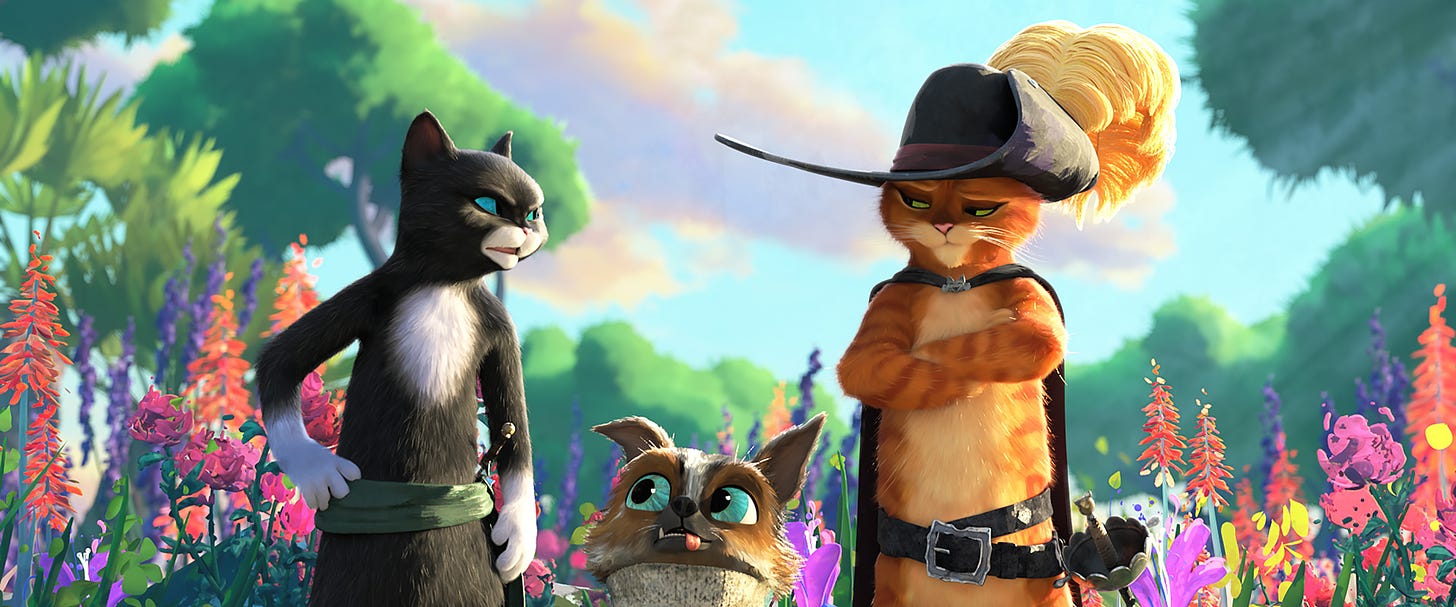
PUSS IN BOOTS: THE LAST WISH
(now in wide release)
Eleven years is a long time to wait for a sequel, but here we are getting PUSS IN BOOTS: THE LAST WISH anyway. I guess you can justify it when you’re talking about a spin-off to what was Dreamworks’ flagship animated franchise—especially with a planned reboot of SHREK also on the docket. You cap your quadrilogy with PUSS IN BOOTS in 2011, bide time to ride the HOW TO TRAIN YOUR DRAGON wave, and then dip your toes back into the fairy tale universe housing Far Far Away with a standalone lark first. Give us another adventure with swashbuckling hero Puss in Boots (Antonio’s Banderas) to set the table.
You could say all those years passed for the characters too considering screenwriters Paul Fisher and Tommy Swerdlow position mortality as the central theme of our return. Puss is back at his usual antics dripping in ego and invincibility when he suddenly wakes upon a doctor’s table to learn he’s just lost his eighth life. That means he only has one left—a fact he initially brushes off with a shrug before coming face-to-face with The Big Bad Wolf (Wagner Moura). Is the latter’s bounty hunter truly skilled enough to take Puss down and finally pierce his skin with a blade? Or has all this talk of dying shaken Puss into losing his edge? Either way, retirement seems his sole alternative to oblivion.
Rather than end the story in anonymity, however, CROODS: A NEW AGE director Joel Crawford and company introduce the myth of “the last wish.” With Big Jack Horner (John Mulaney), Goldilocks (Florence Pugh) and her Bear Crime Family (Ray Winstone, Olivia Colman, and Samson Kayo), and Kitty Softpaws (Salma Hayek Pinault) all on its trail, it’s only fitting that Puss would join one last thrill ride in the hopes of wishing his lives back. And while they all crave something they think they need but might already have (save Jack as he’s literally just a self-aware soulless ghoul), along comes little Perrito (Harvey Guillén) wanting for nothing but friendship like all the best dogs do.
It’s a kitchen sink-type, chaotic race through the magical dark forest with life lessons, flashbacks, and the irreverent humor we’ve come to love from this franchise. I could do without the anime-style, herky-jerky fight aesthetic shifting from 3D to a faux-2D perspective, but otherwise enjoyed the animation upgrade. The bear family is auditioning to be Guy Ritchie’s latest band of hapless wannabe thieves, Mulaney is having way too much fun as a psychopathic nursery rhyme (opposite his Jiminy Cricket facsimile “conscience” voiced by a Jimmy Stewart-channeling Kevin McCann), the Wolf lends a legitimate sense of urgency with a dark foreboding and Omar Little whistle, and Puss, Kitty, and Perrito teach us that a life of love beats legend any day.
- 7/10
RRR (RISE ROAR REVOLT)
(now streaming on Netflix)
While the calls for RRR (RISE ROAR REVOLT) to get an Oscar nomination as Best Picture (since India chose LAST FILM SHOW for International Film consideration instead, ultimately making the shortlist) are akin to the people who wanted SPIDER-MAN: FAR FROM HOME to get one last year—namely that the shiny new toy you just saw being fun and exciting doesn’t mean it’s a masterpiece—I can’t say S.S. Rajamouli’s epic isn’t still an absolute blast. With crazy choreographed fights, a ton of romance and humor, wall-to-wall computer effects (including wild animals that probably didn’t need a full disclaimer to tell us as much in case we were worried real tigers, etc. were used), and the most homo-erotic leading duo since POINT BREAK, what’s not to love about this historical-set fantasy?
Hardly original in narrative with adversaries accidentally becoming best friends only to realize it too late and have to choose between “brother” and “mission,” it is wild in its orchestration with one climactic fight unfolding fully on piggyback. There’s some big brain insanity in that respect to offset the otherwise over-the-top theatricality of caricatured villains (Ray Stevenson and Alison Doody as the governor and his bloodthirsty wife leave little scenery left after chowing down every time the camera places them in frame) and swooning score. But that’s Tollywood for you. It’s all a heightened state of reality with musical montages, interludes (“Naatu Naatu” made the Oscar Song shortlist), and supernatural-esque sequences imbuing men with God-like powers.
And why shouldn’t Bheem (N.T. Rama Rao Jr.) and Ram (Ram Charan Teja) become Gods? These are two men who would laugh in the face of danger if they weren’t so gosh darn serious every time danger rears its head (it’s often, very often). The former is his peaceful village’s champion, sent to Delhi to rescue a young girl the governor “bought” by any means necessary. The latter is an ambitious royal officer in the governor’s army looking for a promotion by single-handedly jumping into a violent gang of Indian civilians to arrest someone who dared to throw a rock, earning a couple concussions for his trouble. They were rendered as Gods well before the plot (and music lyrics) caught up. Gods, patriots, lovers, and friends-to-the-end. Who better to start an explosive revolution?
- 7/10
SAINT OMER
(now in its Oscar-qualifying theatrical run with limited release on January 13, 2023; France’s International Oscar submission)
Why doesn’t Rama (Kayije Kagame) want her family to know she’s pregnant? That’s the central question I took from an extended prologue of sorts wherein she and her white husband Adrien (Thomas de Pourquery) visit her Senegalese mother and sisters for a meal before leaving Paris on a work trip. Everyone exchanges their usual pleasantries, asking what they’ve been up to, etc. Adrien is careful with his language when explaining that they won’t be vacationing this year because of a “major project” to complete at the house. He looks at Rama to deliver the news and she avoids the subject, dismissing the implication completely. Why?
Alice Diop and her co-writers (Amrita David and Marie N’Diaye) set the stage for SAINT OMER to deliver a simple answer: that Rama is nervously unsure of what’s to come. From an opening dream calling out for her own mother to the obvious strain in their present-day relationship, we can assume she fears becoming that which she now resents. And it’s not without reason once memories of conflict and emotional repression rear their head. How much of who her mother is will rub off once she’s a mother herself? Is giving birth a mistake? Will attending the trial of a young woman accused of infanticide help her to see that things could be worse? Or will doing so prove they already are?
The juxtaposition is ultimately a heartbreaking one since the reality of Laurence Coly’s (Guslagie Malanda) case proves much more complex than the news reports her very conservative and white community of Saint-Omer depict. They paint her as a murderer. A monster. And she doesn’t necessarily disagree since she admits to the crime. But not to the guilt. Her defense is sorcery—that her aunts cursed her. Her attorney’s defense is insanity. The truth lies somewhere in-between once details reveal that Laurence’s circumstances are so heavily steeped in cultural bias and racist imperatives. People ask how this “intelligent” and “eloquent” Black woman could do such a thing? But how do either of those attributes matter?
Laurence’s parents put undue pressure upon her to be unimpeachable in white society. She moved to France to get away from that unspoken oppression only to find herself in Saint-Omer with an older white boyfriend (Xavier Maly’s Luc Dumontet) and an increasingly hostile air of “otherness” that led to an unhealthy seclusion. Her entire life was thus dictated by this idea of manufactured perception—to be that which others demanded rather than finding that which she embraced. Rama sees her own insecurities projected throughout the courtroom. The preconceptions. The assumptions. The casual disregard for the fifteen-month-old victim in lieu of deciding which adult was more at fault for her death.
Reading that much of the on-screen scenario was born from lived experience (Diop, like Rama, sat in on a real infanticide trial herself) makes sense considering how meticulously rendered and performed the courtroom scenes are. But also because of the emotions Diop imbues via her actors’ performances and her decision to splice in Rama’s silent memories of a tired mother struggling to survive under the weight of unjust expectation. The comparison allows for a refocused understanding of who this woman was. Because while motherhood is inherently scary and the past, present, and future of one’s own DNA and environment exacerbate that terror, knowing this truth can also be a blessing. No matter how alone you may feel, you never truly are.
- 8/10
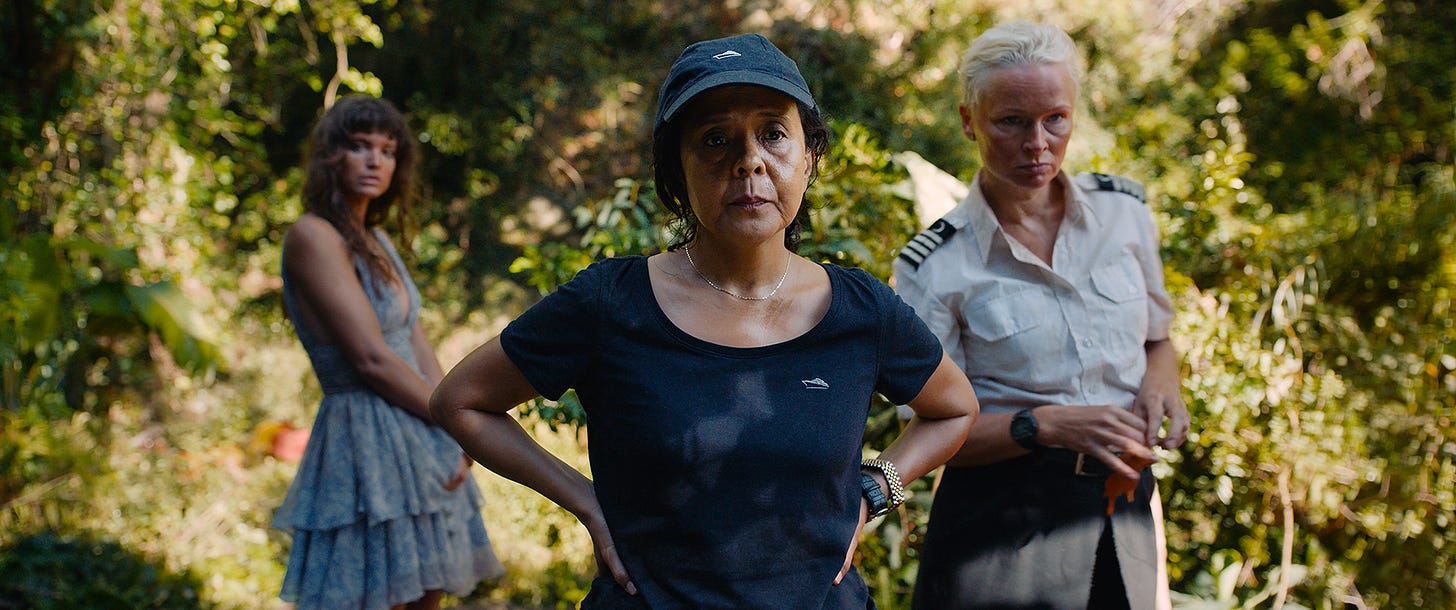
TRIANGLE OF SADNESS
(now on VOD/Digital HD)
I think it’s official: Ruben Östlund films just aren’t for me. While I enjoyed FORCE MAJEURE a lot (yet still not as much as it seemed everyone else around me did), THE SQUARE was simply too scattershot and on-the-nose to really enjoy it as more than a lark. I feel the same about TRIANGLE OF SADNESS, probably because it’s pretty much the same film—skewering the fashion world and capitalism instead of the art world. Both have memorable dinner scenes. Both possess a game cast with some genuinely hilarious moments. And both are way too long. Östlund has some great ideas, but it almost seems his goal is to intentionally push the joke beyond its limits of insufferability.
I love the idea of satirizing the wealth gap by having outlandishly rich patrons on a yacht juxtaposed against the overworked and fearful help desperately seeking a big tip they probably won’t get (rich people are often rich because they are the most frugal people alive). I’m not sure Östlund actually brings anything new to the table on the topic, though. He pokes fun at those who earn their wealth with filth (Zlatko Buric’s “shit salesman” is an unhinged riot), weapons, and influence (the late Charlbi Dean’s Yaya and Harris Dickinson as her boyfriend Carl are the straight men and thus de facto leads), but only for gags. Even Woody Harrelson’s comedic timing can’t save an underwritten role that’s only here as a socialist American foil to Buric’s capitalist Russian. And the help rarely get more than directions to look awkwardly uncomfortable.
Act One intrigues because of its intimate scale and conversations about gender roles where it pertains to money (it’s just Dean and Dickinson arguing about financial intent when it comes to dating). Act Two widens the scope by putting them on a cruise well out of their price range (Yaya got tickets in exchange for some Instagram posts), but it quickly pushes them to the background to let the caricatures around them act like fools. Act Three flirts with true commentary by leaving a handful of passengers shipwrecked on an island with the yacht’s “toilet manager” (a wonderful Dolly De Leon) flipping the table to become their leader as the only person who can survive with her own two hands, but it never takes the next step. Östlund is an expert at writing gags, but I just can’t buy that they add up to anything like so many others apparently can.
- 6/10
THE WHALE
(now in limited release)
Watching Darren Aronofsky’s cinematic adaptation of Samuel D. Hunter’s play THE WHALE doesn’t make me wonder how it works on-stage as much as how it might work under the guidance of a more sympathetic director. That’s not to say Aronofsky is unsympathetic. I think he and Brendan Fraser bring the character of Charlie to life in a way that objectively humanizes him and allows his pain—created from an unyielding anguish and depression—to be understood. Unfortunately, however, you cannot deny that Aronofsky doesn’t also lean into the external, horror-infused perspective that people like Charlie are often dismissed as grotesque, pitiable monsters. It’s therefore tough to reconcile our desire to empathize with the tempest of emotions surrounding him against an adaptation that seems hellbent on preventing us from doing so.
It’s a slippery slope. You do need to depict people’s heinous persecution of him since it’s a part of his story. A lot of what Charlie has become stems from the stigma that society places upon obesity (and homosexuality). The trick is thus not using that depiction in a way that, intentionally or not, normalizes that reaction. We spend almost ninety minutes with Charlie as he bares his soul while the facts surrounding his struggles (fatherhood, sexuality, religion, mental illness, etc.) are revealed. Why, after all that, do you then create a scene wherein he’s “caught” in public in such a way that the person who sees him runs away? What does that add? It’s one thing if the film was about said reaction en route to judging society’s shortcomings. But it’s not. It doesn’t. So, choosing to portray it anyway feeds into calls of exploitation. You don’t need that shame to then catalyze Charlie’s subsequent decision to voluntarily be seen. Thinking you do is lazy.
What a shame too considering the performances Aronofsky receives from Fraser (the fat suit, while problematic, was always going to prove necessary for financing since this film doesn’t get made with an unknown entity who’s naturally that size) and Hong Chau as his friend/nurse Liz. They imbue a bottomless wealth of compassion and history to these characters—so much so that the love they share easily outweighs the cruelty of others sneaking in. Their tenderness provides the leeway to let Sadie Sink’s Ellie (Charlie’s estranged daughter) be so vicious. She has every reason to be that way after all. His obesity is merely an easy target with which to package her justified rage. It does beg us to ask the million dollar question, though: Why make Charlie obese at all? Because being able to narratively use it as a means of manifesting his self-loathing and guilt isn’t good enough. That renders it a stunt and ultimately feeds into the stigma rather than combat it.
You can argue that it’s just one example of many instances of psychological trauma on-screen, but it’s the only one that takes physical shape. Ellie’s issues don’t utilize a fat suit. Thomas’ (Ty Simpkins) don’t either. At a certain point, Charlie’s disability stops being a character trait to become the entire character. And yet the film continually refuses to acknowledge it because it would rather just use it as a trigger for Charlie to want to get his affairs in order. That way Hunter can ratchet up the drama via more secrets couched in a not-so-deep commentary on Red State politics without ever confronting the sickness itself. Because without Fraser and Chau's performances, that's all this really is: a shallow plea for kindness in a world so cynical that people have grown less accepting than they already were in hopes that God gives them a reserved seat at the apocalypse.
- 6/10
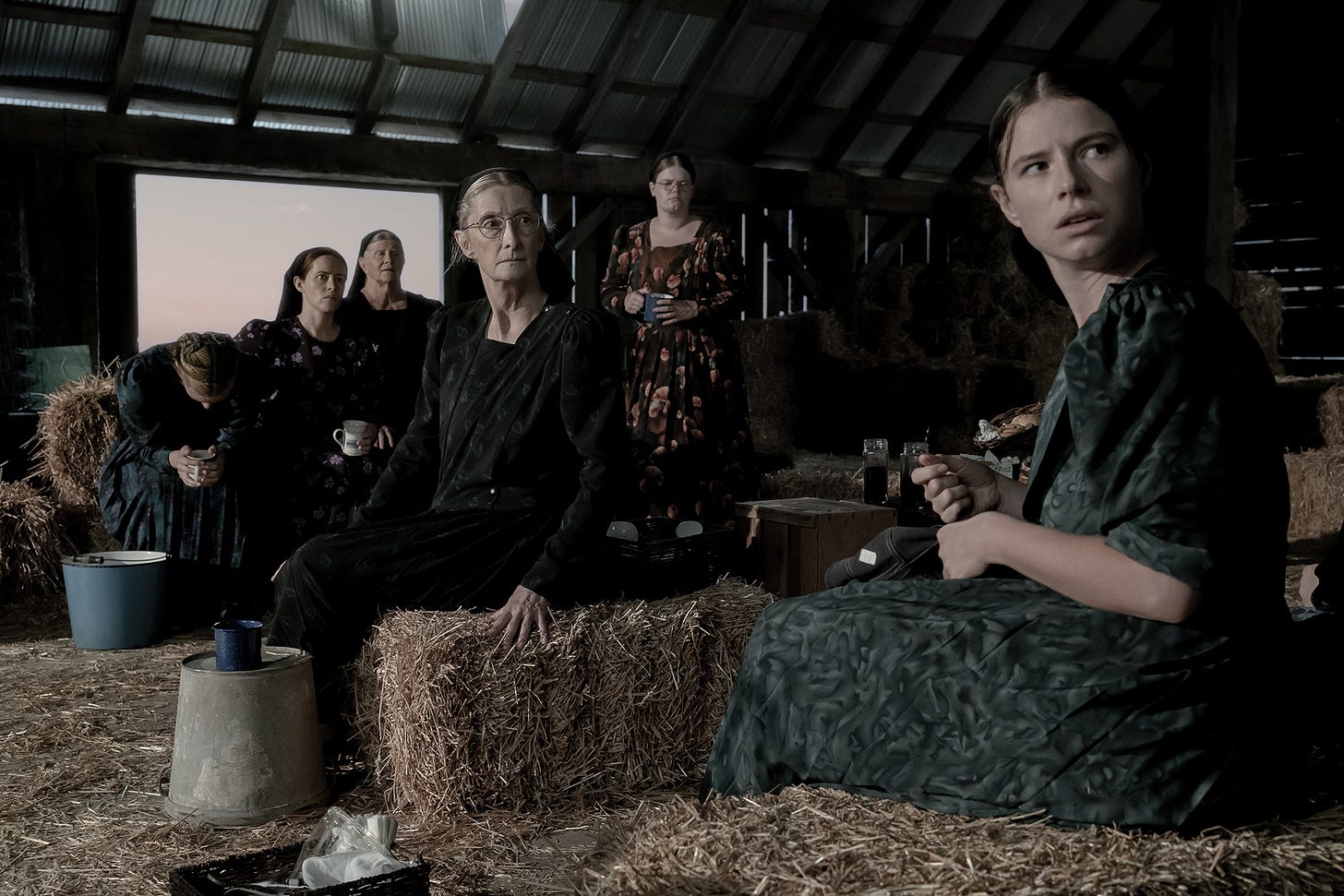
WOMEN TALKING
(now in limited release)
“And in that gaping silence was the real horror.” What a line. It’s spoken via narration towards the beginning of Sarah Polley’s adaptation of Miriam Toews’ novel WOMEN TALKING—words born from hindsight by one of the young girls residing in the strict Mennonite colony where it is set. She’s providing context for the meeting that’s being held in a hayloft between the women of three families attempting to decide the fate of all women in their community. The “silence” is their lack of language, education, and privilege to fight back. The “horror” is their subsequent inability to band together and stop the atrocities committed upon them by their men while also allowing themselves to become involuntarily complicit to that violence. It’s the product of a power void those same men created and continue to enforce to maintain their control. And the time has come to fill it with righteous fury.
While the events on-screen are fictional (and described as such by a clarifying caption), don’t be fooled into believing its exercise isn’t based in truth. I’m certain there will be some viewers who discover that it takes place in 2010 and scoff, ignorant to the fact that Toews loosely based the scenario on real events that occurred in Bolivia circa 2011. There, like here, saw the rampant and unchecked domestic abuse and rape by men from the community against their wives, sisters, daughters, and neighbors with the assistance of animal tranquilizers. The women in the film were told they were hallucinating. Lying for attention. Victims of ghosts or demons. Only when one caught her attacker and forced him to name names were they finally arrested. So, the colony leaders did the only thing they could do: threaten the women to forgive their abusers or lose their place in Heaven.
In another of many brilliant lines of dialogue, it’s explained that these women who cannot read or write quickly teach themselves how to vote. There are three choices to decide between while all the men are in town trying to bail out their brethren. Stay and forgive. Stay and fight. Or leave and never return. The narrative premise is that the democratic process ends in a three-way tie pitting three of the most well-respected families against each other to hold a debate. Frances McDormand’s domineering and scarred Janz won’t be swayed from forgiveness. Salome (Claire Foy), daughter of Agata (Judith Ivey), wants blood. Her sister Ona (Rooney Mara), impregnated by her rapist, sees leaving as the freedom to witness a world that’s been kept from them.
Add Greta’s (Sheila McCarthy) desire to at least try finding consensus despite her daughter Mariche (Jessie Buckley) angrily interrupting and refuting the others’ points and the stage is set for a rousing dialogue that moves between indignation, introspection, pragmatism, unbridled emotion, and even a few well-placed hints of humor. We hear their respective cases, watch as they alter minds and change their own, and get transported back to their individual traumas with effectively rendered flashbacks that always prove contextually relevant to the current topic of conversation. Faith. Pacifism. Education. Love. Autonomy. It may just be eight women and their minutes-taker (Ben Whishaw’s recently returned August) arguing in one room for the duration, but it’s the most dynamic and tense film I’ve seen all year.
Because you don’t know how things will shake out. The narration teases that some of these women leave, but says nothing about the nightmarish drama that could potentially occur beforehand—whether by the men’s early return or the women passionately defending their right to not back down. Foy is a force of nature. Buckley is heartbreaking in her nihilism. Ivey and McCarthy deliver steadying maternal hands of wisdom earned from decades of knowing what “forgiveness” has already wrought. And Whishaw, along with August Winter’s Melvin, devastates as a masculine counterpoint that strengthens the women’s resolve. We’re witnessing a reckoning—a rebellious cry to erase that silence once and for all with tears of sadness for what’s left behind and joy for what’s to come. And above all else: relief.
- 10/10
Cinematic F-Bomb -
Here’s a fun one from KUFFS wherein Tony Goldwyn says the f-word so many times that they have to bleep all but one to keep a PG-13 rating. A solid gag. (Substack apparently can’t handle an embedded gif, so you’ll have to click over for a smoother experience. Or see everything at cinematicfbombs.com.)

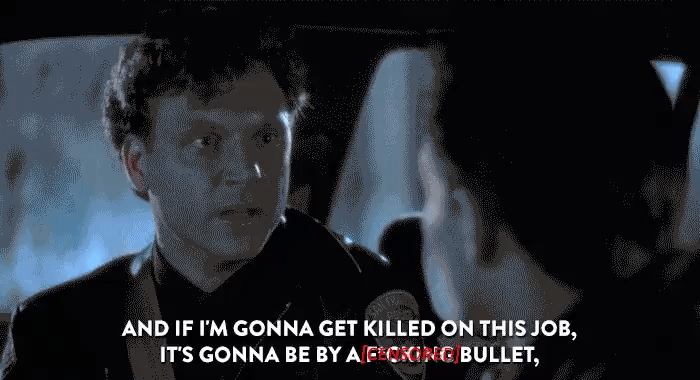
New Releases This Week:
(Review links where applicable)
Opened Buffalo-area theaters 12/21/22 -
PUSS IN BOOTS: THE LAST WISH at Dipson Flix; AMC Maple Ridge & Market Arcade; Regal Elmwood, Transit, Galleria, Niagara Falls & Quaker Crossing
Thoughts are above.
THE WHALE at AMC Maple Ridge
Thoughts are above.
Opening Buffalo-area theaters 12/23/22 -
18 PAGES at Regal Elmwood
BABYLON at North Park Theatre; Dipson Amherst & Flix; AMC Maple Ridge & Market Arcade; Regal Elmwood, Transit, Galleria, Niagara Falls & Quaker Crossing
“I have to give Chazelle credit because he goes for broke and shows little room for regret. Unfortunately, no matter how electric those first couple hours may prove, the third (yes, full third hour) can't help but drag.” - Full review at HHYS.
CIRKUS at Regal Elmwood
DHAMAKA at Regal Elmwood
WHITNEY HOUSTON: I WANNA DANCE WITH SOMEBODY at Dipson Amherst & Flix; AMC Maple Ridge & Market Arcade; Regal Elmwood, Transit, Galleria, Niagara Falls & Quaker
Streaming from 12/23/22 -
GLASS ONION: A KNIVES OUT MYSTERY - Netflix on 12/23
“Despite Glass Onion not being as smart as Knives Out, it was definitely just as entertaining—if not more.” - Full review at jaredmobarak.com.
SAVING CHRISTMAS SPIRIT - AMC+ on 12/23
THE BOY, THE MOLE, THE FOX AND THE HORSE - AppleTV+ on 12/25
THE KINGDOM EXODUS - “Exodus” - MUBI on 12/25
ROALD DAHL’S MATILDA THE MUSICAL - Netflix on 12/25
VIR DAS: LANDING - Netflix on 12/26
CHELSEA HANDLER: REVOLUTION - Netflix on 12/27
7 WOMEN AND A MURDER - Netflix on 12/28
A NIGHT AT THE KINDERGARTEN - Netflix on 12/28
STUCK WITH YOU - Netflix on 12/28
Now on VOD/Digital HD -
AFTERSUN (12/20)
“Wells leaves the details unspoken via a formally fluid, sensorial experience. All we really know for certain is that their love for each other was undeniable—Mescal (unforgettably vulnerable) and Corio's performances ensure it.” - Full review at HHYS.
ANATOLIAN LEOPARD (12/20)
CODE OF SILENCE (12/20)
THE DISAPPEARANCE OF TOBY BLACKWOOD (12/20)
INU-OH (12/20)
“The juxtaposition of what they're doing in such an antiquated setting is intriguing enough to keep our attention. The music being catchy and the performances being invigorating is icing on the cake.” - Full review at The Film Stage.
LAST FLIGHT HOME (12/20)
SPOILER ALERT (12/20)
VIOLENT NIGHT (12/20)
STRANGE WORLD (12/23)





